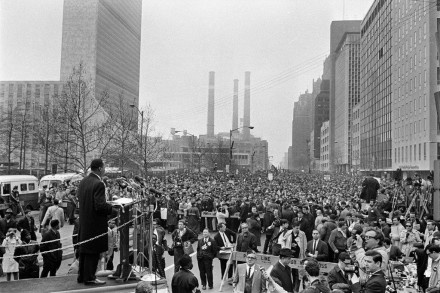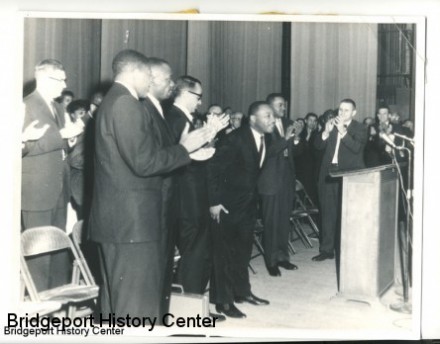From The New York Times:
The Montgomery bus boycotts. The marchers at Selma. The “I Have a Dream” speech.

From the moment he emerged as a civil rights icon during the mid-1950s through the mid-1960s, the Rev. Dr. Martin Luther King Jr. led a movement whose successful protests are now shorthand for their era.
He made it look easy. But it was not, and the last year of his life was no exception. The struggles he encountered then can be found spelled out in the headlines of The New York Times.
The archives tell the story of a leader who was facing discord among the various factions pushing for racial justice; testing the waters with a new initiative for poor people; witnessing persistent support for segregation; and facing the ultimately fatal violence of people who opposed civil rights.
Full story here.



*** Anyone interested in reading a good book about MLK’s last days before he was killed & the fact that the whole story about his assasination is still very vauge, even today? Should read “The Bishop’s Pawn”,you may find it very interesting!***
One of Martin Luther King Jr greatest speech was made 51 years ago today at Riverside Baptist Church in New York.
Beyond Vietnam: The MLK speech that caused an uproar
It was an unequivocal denunciation of America’s involvement in Vietnam.
https://www.usatoday.com/story/news/nation-now/2017/01/13/martin-luther-king-jr-beyond-vietnam-speech/96501636/
*** Slight over-sight Mr. Mackey, if MLK was killed 50 yrs. ago today, then he would not of been able to make a speech 51yrs. ago today, no? ***Just Saying***
Mojo- do the math. Mackey is correct. If he died 50 years ago then he could not have made a speech 49 years ago but he was alive 51 years ago- Just saying.
Steve,
So you can do the math? How revealing….you have been shy to talk about fiscal matters specifically, ostensibly because you don’t do finances, or some such statement, though you continue to be a property taxpayer, perhaps.
So if, as Mayor Ganim continues to repeat, he inherited a $20 Million deficit, what did he learn from solving the problem other than cutting back approved budget items, going to Hartford for permission to kick long term pension obligations down the road a bit longer, sale of City property and bond refunding that makes room in current budgets for decreases, by often increasing the present value of future payments. Again kicking obligations down the road.
Quibble anytime you wish, Steve. You do math. Just not money. Is that your next class? As a member of the DTC, do you need to know anything about City finances? Time will tell.
Reverend King brought multiple subjects of injustice to Americans of all colors, class and persuasions and he did so in a non-violent manner with a vision for the future….a dream. And he became a martyr for his beliefs.
It is not a good excuse for my watching the parade rather than marching in it, but my knowledge and in-depth awareness of history of the Americas was not strong enough for me to see and understand the living inequalities that are so present in today’s rearview history mirror. Getting to know and go beyond my own privilege and attempting to secure more equity for others are two personal active thrusts in recent years. I have been assisted in my conversion journey by amazing writing and research that touches on the oppressions and violations of the past on people of color at too many moments in their lives.
An attitude of “white supremacy” maintains today in too many places and requires a willingness to challenge the status quo for purpose of justice rather than for personal self-gain. Who will join in this journey? Who will re-form their viewpoints and commit to a full blooded conversion with daily practical application? Time will tell.
“I don’t know what will happen now. We’ve got some difficult days ahead. But it doesn’t matter with me now. Because I’ve been to the mountaintop. And I don’t mind. Like anybody, I would like to live a long life. Longevity has its place. But I’m not concerned about that now. I just want to do God’s will. And He’s allowed me to go up to the mountain. And I’ve looked over. And I’ve seen the promised land. I may not get there with you. But I want you to know tonight, that we, as a people will get to the promised land. And I’m happy, tonight. I’m not worried about anything. I’m not fearing any man. Mine eyes have seen the glory of the coming of the Lord.”
This is what I remember about Dr. King prior to his assassination and the mode of America.
Dr. King spoke of a “white backlash”—a term he helped popularize—to his movement. But in retrospect, the strength of the reaction he predicted and endured often receives short shrift. The support of white moderates who recoiled at images of Negro children sprayed by hoses and attacked by dogs was instrumental in passing laws that ended legal segregation and protected voting rights. But by 1966, it had become clear that many of these whites chafed against further activism and greater demands for equality. They viewed the Voting Rights Act as a final concession; King saw it as a start. According to Gallup polls, King’s popularity waned in the coda years of his life; his unfavorability rating reached 63 percent in 1966. At the same time, public opinion turned firmly against the civil-rights movement.
In his “Letter From a Birmingham Jail,” King called out organized religion, politicians, the black church and even the Constitution. But there was one group that raised the ire of King more than any other:
First, I must confess that over the past few years I have been gravely disappointed with the white moderate. I have almost reached the regrettable conclusion that the Negro’s great stumbling block in his stride toward freedom is not the White Citizens’ Councilor or the Ku Klux Klanner, but the white moderate, who is more devoted to “order” than to justice; who prefers a negative peace which is the absence of tension to a positive peace which is the presence of justice; who constantly says: “I agree with you in the goal you seek, but I cannot agree with your methods of direct action”; who paternalistically believes he can set the timetable for another man’s freedom; who lives by a mythical concept of time and who constantly advises the Negro to wait for a “more convenient season …
I suppose I should have realized that few members of the oppressor race can understand the deep groans and passionate yearnings of the oppressed race, and still fewer have the vision to see that injustice must be rooted out by strong, persistent and determined action.
Don, I was a teenager in the Air Force as a firefighter in Goldsboro, NC when MLK was shot and killed. That night there was a riot and burning of some businesses in Goldsboro and the mayor asked our base commander for firefighters to help. During roll call the next morning we were inform of this and the senior black firefighters asked the fire chief if the back firefighters could discuss what was being asked of us. We knew that we couldn’t refuse a direct order but we also knew that power of the water turrets on our fire vehicles could break a cinder block and cause great harm if we were asked to do crowd control. The fire chief said if we were requested to help that we would only do fire suppression. It created a divide between black and white firefighters because many of the white firefighters didn’t understand why Dr. King was going to different cities in the south causing trouble.
Don, what you said was exactly what was going on with us at that time and now when you said, ” I should have realized that few members of the oppressor race can understand the deep groans and passionate yearnings of the oppressed race, and still fewer have the vision to see that injustice must be rooted out by strong, persistent and determined action.”